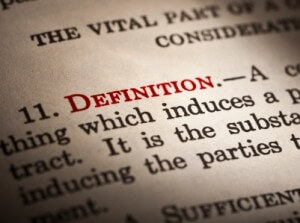Brand Name Vocab: Battle of the Shampoos
As the jingle goes: “Sometimes you need a little Finesse … sometimes you need a lot.”
 Can this shampoo give you 1) extreme delicacy in actions or tastes?
Can this shampoo give you 1) extreme delicacy in actions or tastes?
2) skill in handling a difficult or highly sensitive situation?
3) a trick, artifice, or stratagem?
While a nattily-dressed person could be said to have a pert outfit, one’s parents might very well say something like “Don’t be pert with me, young lady!” That is, pert has a few different meanings.
 Can this shampoo make you impertinent?
Can this shampoo make you impertinent?
Chic? Lively?
Now, if only someone made a shampoo called Omniscient or Pecunious.
Three-Letter Words: Fey
 Some of the most perplexing words on the GRE are diminutive. Who doesn’t see PAN : REVIEW and metaphorically scratch his or her head, or wonder what, exactly, a nib or a gin is on its own? Welcome to Three-Letter Words. A few of them might make you want to deploy some four-letter words.
Some of the most perplexing words on the GRE are diminutive. Who doesn’t see PAN : REVIEW and metaphorically scratch his or her head, or wonder what, exactly, a nib or a gin is on its own? Welcome to Three-Letter Words. A few of them might make you want to deploy some four-letter words.
Fey? Like Tina Fey? Perhaps Tina Fey is descended from fairies, since the word fey means, weirdly:
- like a fairy or elf; otherworldly, supernatural
- doomed to die, or full of the sense of impending death
- appearing touched or crazy
- acting an an affected way (like a modern person who thinks she’s a fairy)
Wow, that’s a lot of meanings. Let’s try some!
After seven days in the forest with only dewdrops to drink, he began seeing elves, trolls, and tiny, sparkly, fey creatures with itty-bitty flapping wings.
The fey old woman said, her hand shaking: “I don’t have much time left! You must turn off the cat and appraise cloud eleven!” Whoa.
The pop star — who until 2008 had been an unassuming college music major — all of the sudden adopted a fey demeanor, speaking in an unplaceable accent and displaying a disturbed but very artistic-looking twitch.
Try a sample Antonyms problem:
FEY :
A. adamant
B. ruddy
C. thaumaturgical
D. hale
E. meretricious
Choose your own answer, then click “more for the solution.
Visual Dictionary: Incendiary
Sometimes, a picture is worth a thousand words. Interestingly, just as “percent” means “per 100,” there’s a word for “per one thousand”: permille (also spelled permil, per mille, etc.) There’s even a symbol for it: °. So you could say that, in some cases, a word is 1° of a picture. Welcome to Visual Dictionary, a series of posts about words that are better expressed in pictures.
 Also incendiary.
Also incendiary.
An incendiary (such as dynamite) can literally set things on fire, or an incendiary (such the rebels of the Boston Tea Party, or Thomas Paine’s pamphlet Common Sense) can incite people towards strife or revolution. The word can be an adjective or a noun. As a noun, it can be an object or a person.
Consider this Antonyms problem…
INCENDIARY:
A. mallet
B. peeler
C. extinguisher
D. conflagration
E. tenderizer
…and this one.
INCENDIARY:
A. lukewarm
B. inflammatory
C. fractious
D. diluted
E. conciliatory
Look, one more!
INCENDIARY:
A. ascetic
B. pacifier
C. revolutionary
D. legate
E. stoic
J. K. Sesquipedalian: Vocab in Harry Potter
J. K. Rowling, author of the Harry Potter series, knows a profusion of Latin. When the first book came out in 1997, I noticed that villain Draco Malfoy‘s name was no accident. Sounds pretty evil, right?
 If that name sounded nefarious but you weren’t sure why, it was probably because “mal” literally means “bad” in Latin: malnutrition, malady, malevolent, maleficent, malediction.
If that name sounded nefarious but you weren’t sure why, it was probably because “mal” literally means “bad” in Latin: malnutrition, malady, malevolent, maleficent, malediction.
But “Draco” is even more interesting. The first Draco was a legislator in Athens in the 7th century B.C. His legal code forced people into slavery for their debts and specified the death penalty for even minor offenses; this barbarous code has given us the English word draconian, which means unusually harsh or cruel, especially in relation to laws and government.
There are plenty of other Harry Potter names related to GRE vocabulary words. The heroine of the series, Hermione Granger, is “Muggle-born” (that is, born to non-magical parents) — and, appropriately, a “granger” is a farmer. (Interestingly, many words about farming, such as provincial and yeoman, have come to take on the meaning or connotation of “ordinary”).
Of course, some of the names in the Harry Potter series, such as “Andreyius Snicklepitch,” are just meant to be ridiculous.
Welcome to the Manhattan GRE blog!
 Welcome to the Manhattan GRE blog! We hope you’ll come back daily, making us your diurnal (or perhaps preprandial, or postprandial, or matutinal) lexical stopover!
Welcome to the Manhattan GRE blog! We hope you’ll come back daily, making us your diurnal (or perhaps preprandial, or postprandial, or matutinal) lexical stopover!
Since vocabulary is the pith, the crux, the marrow, the essentia of the GRE verbal section, every day we’ll post a GRE word, or several words clustered around a theme, in a way that relates to current events, pop culture, or the other aspects of the world around us.
Some experts say that you need to hear, read, or use a word 7 times to really know it. Other experts give different numbers, but the crux is: the more you interact with a word, and the more different ways in which you interact with that word, the better. Therefore, we’ll use a variety of media for greater mnemonic efficacy!
Are you ready to exigently augment your vocabulary? Let us commence!
